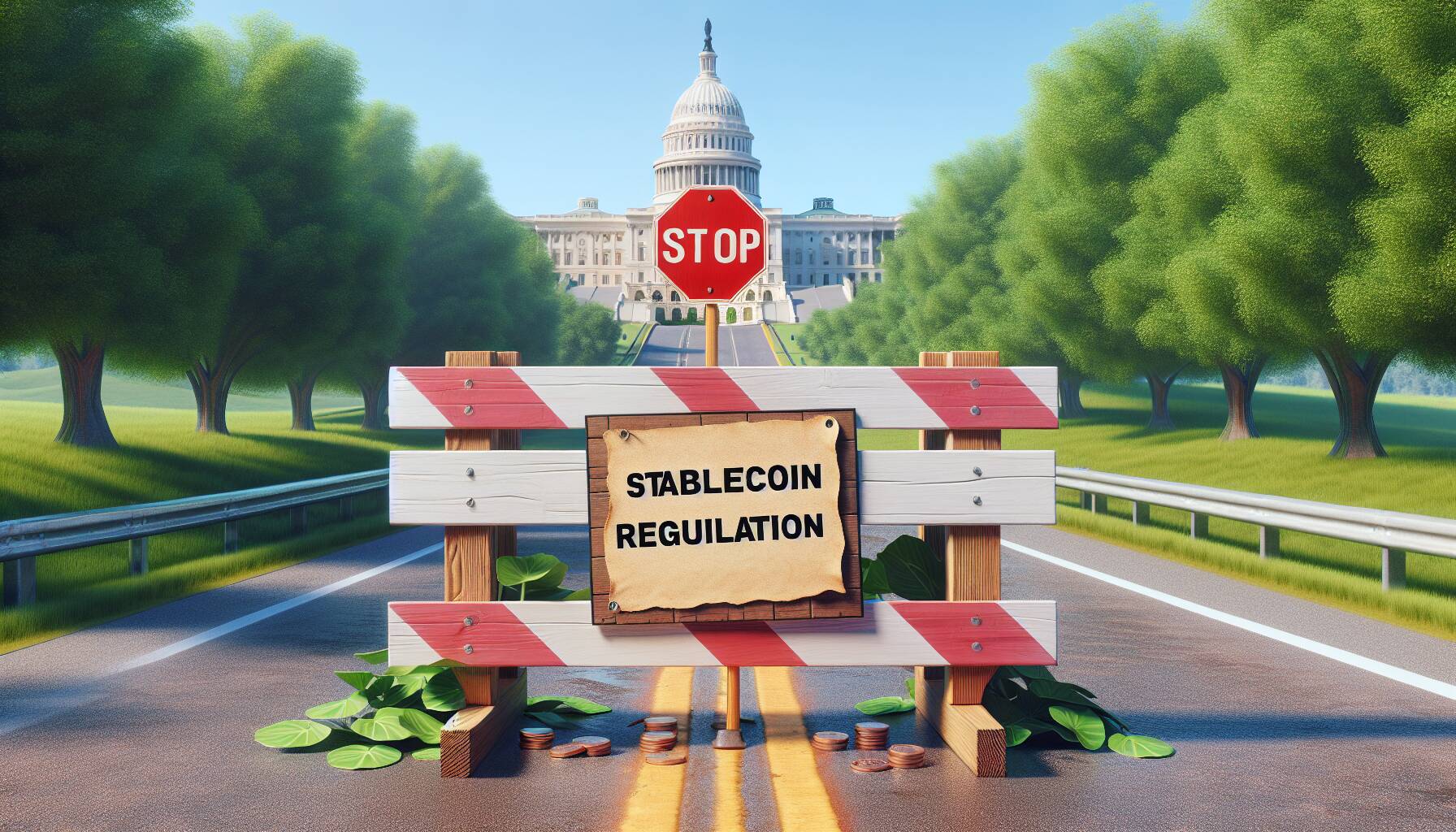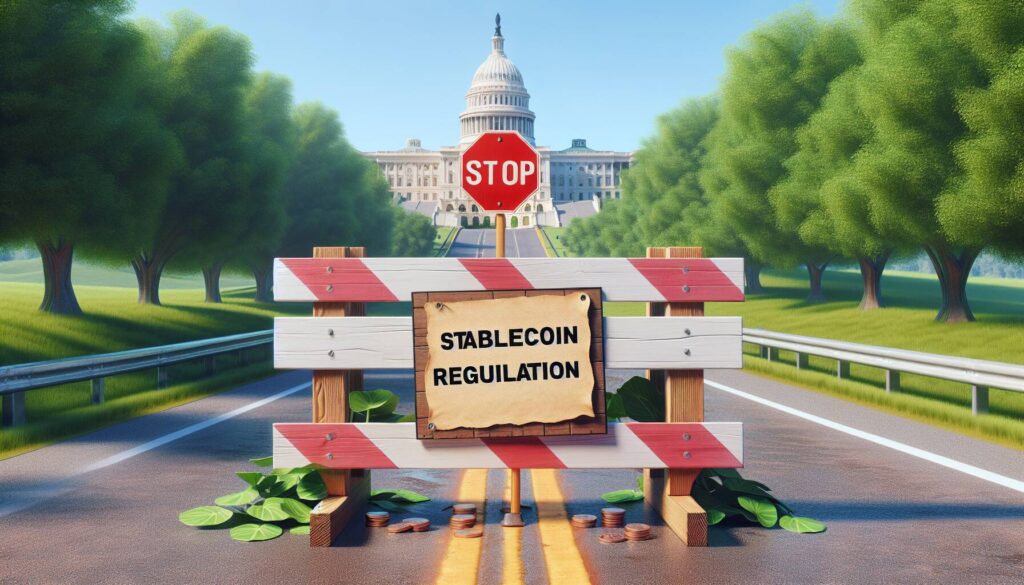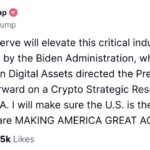The push for stablecoin regulation in the United States hit a significant roadblock on Thursday, as a critical piece of legislation faced unexpected resistance from Democratic senators. This bill, aimed at establishing a framework for digital currencies like Circle’s USDC and Tether’s USDT, had previously garnered bipartisan support but was unable to advance in a key Senate vote, falling short of the required 60 votes by just one, ending with a tally of 48-49.
Senators Josh Hawley and Rand Paul, breaking ranks with their Republican colleagues, joined Democrats in opposing the advancement. The turnabout reflects growing concerns among some lawmakers regarding the bill’s safeguards against potential misuse. Notably, tensions have surfaced surrounding the influence of cryptocurrency on politics, with some Democrats citing the business affiliations of former President Donald Trump as a point of conflict, raising alarms about potential corruption and ethical standards within the industry.
Senator Ruben Gallego, a vocal advocate for the legislation who had previously received substantial backing from crypto political action committees, urged his peers to take the necessary time for a thorough examination of the bill’s text. “We want to bring this economy and this innovation to the United States,” he stated, emphasizing the importance of not rushing such a critical piece of legislation.
“The legislation of this scope and importance really cannot be rushed,” Gallego added, calling for a pause to ensure lawmakers are well-informed.
Meanwhile, other Democratic senators, including Mark Warner, echoed the sentiment that while stablecoins represent the future of finance, proper consumer protections must be a priority before proceeding to debate. Warner highlighted the need for the text to be finalized to adequately serve American interests.
In contrast, Senate Republicans, spearheaded by Majority Leader John Thune, expressed frustration over the stalled progress, insisting that accommodating amendments from Democrats has been a part of the ongoing discussions. Thune voiced concerns that delays could hinder the growth of the crypto sector in the U.S., emphasizing the importance of moving forward with the debate as soon as possible.
As the discussion continues, this setback not only reflects the complexities of bipartisan legislative efforts in the current political climate but also underscores the urgent need for clarity and regulation in the burgeoning cryptocurrency landscape. With both camps eager to shape the future of digital finance, the fate of this critical legislation remains uncertain, leaving the crypto industry in a holding pattern as it awaits further developments in Washington.

Impact of Failed Stablecoin Legislation in the U.S.
The recent failure of the stablecoin regulation bill in the Senate has significant implications for the cryptocurrency industry and consumers alike. Here are the key points related to this event:
- Legislation Stalemate: The stablecoin regulation bill was blocked from advancing due to a slim vote of 48-49, lacking the necessary 60 votes to proceed.
- Bipartisan Support Dwindles: Although the bill had received bipartisan approval in earlier committee discussions, recent Democratic resistance prevented it from moving forward.
- Concerns Over Safeguards: Some Democrats, previously in favor, have raised concerns over inadequate protections against illicit activities and potential conflicts of interest tied to the crypto industry.
- Call for Deliberation: Senator Ruben Gallego emphasized the need for more time to finalize the text and educate opponents before rushing to a vote, highlighting the significance of the legislation.
- Future of Finance: Many lawmakers, like Senator Mark Warner, acknowledge that stablecoins play a crucial role in the future of financial systems but insist that consumer protections must be prioritized.
- Senate Dynamics: The defeat of the bill showcases the complexities within the Senate, where even members of the same party may diverge in opinion, impacting the legislative process for digital assets.
- Impact on Innovation: Senators like Cynthia Lummis argue that the delay could hinder the U.S. from leading in financial innovation and digital currency development.
- Concerns for the Crypto Industry: Lawmakers opposing the bill’s progress are viewed by some as potentially jeopardizing the growth and legitimacy of the crypto sector in America.
“Stablecoins are undeniably a part of the future of finance.” – Senator Mark Warner
This event is pertinent to readers as it underscores the evolving landscape of financial regulations and the importance of consumer protections in the shifting world of digital assets. Following the outcomes of such legislative battles could be crucial for individuals invested in or interested in cryptocurrencies and for understanding the future of personal finance in a rapidly changing digital environment.
Stablecoin Regulation Setback: Analyzing the Legislative Landscape
The recent halt on stablecoin regulation in the U.S. Senate has sent shockwaves through the crypto community, a realm already fraught with uncertainty. With the failed vote focused on the regulation of key players like USDC and USDT, the dynamics of this legislation intertwine with a broader narrative about the future of digital finance. This legislative hurdle highlights both competitive advantages and disadvantages compared to other regions, such as Europe, which is making strides with its own cryptocurrency regulations aimed at fostering innovation while ensuring consumer protection.
Competitive Advantages: The U.S. has positioned itself uniquely as a hub for crypto innovation, boasting numerous blockchain startups and a diverse array of services. The bipartisan push for stablecoin regulation reflects an understanding among lawmakers of the importance of digital assets in modern finance. This could potentially attract foreign investment and reestablish the U.S. as a leading global player in the blockchain space, given that better regulations could offer clarity and security to projects operating here.
Disadvantages: On the flip side, the failure to advance stablecoin legislation might push innovators and investors towards more progressive jurisdictions, notably in Asia and Europe. These regions are not only rolling out comprehensive frameworks but are also doing so at a quicker pace, encouraging a faster adoption of new technologies and stablecoins in their financial ecosystems. Additionally, the internal discord among U.S. lawmakers, as seen with the split votes and shifting party support, undermines confidence in a streamlined regulatory environment.
This legislative stagnation presents a complex scenario for various stakeholders. For crypto investors and firms that thrive on regulatory clarity, the ongoing delays may pose significant risks, potentially stifling innovation within the United States. Conversely, companies already established in environments with clearer regulations may find this moment opportune for expansion, leveraging their regulatory stability to attract U.S.-based clients and projects that are now uncertain about their future in America.
Moreover, the discord among lawmakers signals potential roadblocks for future cooperation, which could hinder meaningful legislation from emerging anytime soon. Companies that have invested heavily in U.S. political action committees may feel betrayed, while advocates for stricter regulations against illicit activities will be affected by their diminished influence following this setback—highlighting the ongoing tug-of-war between innovation and regulation that defines the current landscape.
In essence, while the aspiration for stablecoin regulation remains alive, the current political climate reveals chasms that may deepen, challenging the U.S.’s ability to lead in the rapidly evolving world of digital assets.

















